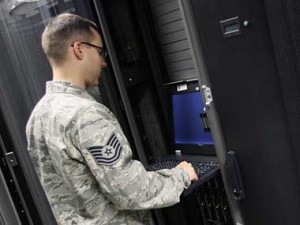London: On the eve of a major international cyber-security conference in London, the British government warned China and Russia that it was dangerous to play both sides when it comes to electronic espionage. However, in many ways the damage has already been done. Western business travellers are taking sometimes extreme precautions to prevent having sensitive business information stolen as they travel and do business in these countries. Baroness Pauline Neville Jones, British Prime Minister David Cameron’s special representative to business on cybersecurity, accused Russia and China of leading the world in cyber-attacks, and ominously, she said:
“It’s damaging in the end to try and play both sides. If you are a company that comes from a country like China you can suffer if in the end people believe it’s threatening to employ your products.”
[caption id=“attachment_121062” align=“alignleft” width=“380” caption=“The US and other countries are preparing for cyber-war. REUTERS”]  [/caption] Chinese companies are already having to deal with cyber-security concerns, especially in the US, due to growing concerns about industrial and state espionage. Chinese networking hardware maker Huawei is rapidly overtaking traditional networking powerhouses such as Cisco in the US, but the company is meeting high level resistance in the US over concerns that its gear might contain backdoors that would give Chinese hackers access to sensitive information. It has even become an issue in the US presidential election, with Texas Governor and Republican candidate Rick Perry being attacked for courting the company to base its operations in the state, despite security concerns expressed by the administrations of both former President George W Bush and current President Barack Obama. According to the Washington Post:
“Three times since 2008, a U.S. government security panel has blocked Huawei from acquiring or partnering with U.S. companies because of concerns that secrets could be leaked to China’s government or military.”
However, it’s not just the US that is concerned about the threat of digital espionage from China. In 2007, the head of Britain’s domestic intelligence service, MI5, warned 300 CEOs and security officers at the nation’s banks and financial institutions to be on guard against electronic espionage from China. The warning said the hackers were looking to steal “commercially-sensitive information”. MI5 repeated the warning in 2010, saying that international public relations and law firms were being targeted, and they warned British business travellers against accepting USB memory sticks and cameras at trade events that might be infected with malware. The warnings were contained in a 14-page document titled, The Threat from Chinese Espionage, which was leaked to The Sunday Times. The report said that high profile figures in Britain’s banking, defence and energy had been targeted. The concerns have led at least one US security expert to buy an iPad for each time he travels to China and never uses the tablet again, according to the Washington Post. US business travellers to Russia, China and even Israel and France are being warned to assume that the wireless internet access is bugged and to leave any unnecessary computers and mobile phones at home. In the last year, a number of high profile attacks have been linked to China including, and the pace of reports only seems to grow. The attacks include: • A coordinated attack against 48 defence and chemical companies mostly in the US and UK, according to security firm Symantec. The attacks were traced to a computer in the US owned by a man in northern China. • Recent reports that hackers, again linked to China, had gained operational control of two US satellites in 2007 and 2008. • Hackers broke into Japan’s largest defence contractor, Mitsubishi Heavy Industries, infecting scores of computers and servers. It was similar to attacks on US-based defence companies that were circumstantially linked to China. • Hackers also recently broke into the email accounts of members of the Japanese Parliament. Japanese news reports linked the attacks to a server in China. The standard, almost reflexive response from China, is always the same. The Chinese government claims that it is also a victim of such attacks and is working to counter cyber-crime. Responding to allegations that China was involved in breaking into Mitsubishi computers, Chinese foreign ministry spokesman Hong Lei said: “China is one of the main victims of hacking … criticising China as being the source of the hacking attacks is not only baseless, it is also not beneficial for promoting international co-operation for internet security.” The beauty of electronic espionage is that it is almost impossible to find a smoking gun. The electronic world is truly one of smoke and mirrors, but with the increasing number of attacks linked to servers in China, the circumstantial evidence mounts and the tension builds. The US has already warned that a cyber-attack might lead to a real world response. A Pentagon official famously told the Wall Street Journal: “If you shut down our power grid, maybe we will put a missile down one of your smokestacks.” The attacks aren’t coming just China.The US estimates that at least 100 foreign governments have tried to hack into its networks. The temperature is definitely rising on the electronic battlefield, and it’s past time for governments to come up with rules for engagement on the internet.


)

)
)
)
)
)
)
)
)



